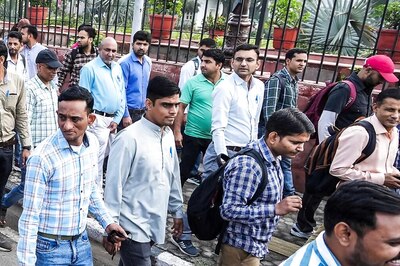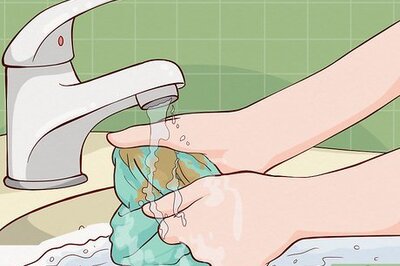
views
Amman: Thousands of Syrians called on Friday for the toppling of President Bashar al-Assad and pledged support for the city of Deraa where tanks and troops have tried to crush resistance to his authoritarian rule, activists said.
"The people want the overthrow of the regime!" demonstrators chanted in the Damascus suburb of Saqba, a witness said, defying violent repression in which 500 people have been killed since the nationwide protests broke out in Deraa last month.
Demonstrations erupted on Friday in the central cities of Homs and Hama, Banias on the Mediterranean coast, Qamishly in eastern Syria and Harashta, a Damascus suburb. Shots were heard in coastal Latakia and two small protests broke out in Damascus, witnesses, an opposition leader and a human rights group said.
In Deraa, Syrian soldiers fired shots in the air to prevent people attending Friday prayers or protesting, a resident told Reuters. Another said busloads of people were heading to Deraa from nearby villages, trying to converge for demonstrations.
"The snipers are on rooftops of buildings firing at anything that moves. They are preventing people from going to the streets," Abu Mohammad told Al Jazeera television.
Witnesses said roads into Damascus were closed on Friday morning to prevent people marching from the rural areas around the capital into the city.
Wissam Tarif, director of the Insan human rights organisation, said snipers were visible in several Damascus suburbs, including Harasta, Daraya, and Douma from where protesters had tried to march into the centre of the capital in the last two weeks, only to be met by bullets.
Another witness said Republican Guard trucks equipped with machine guns patrolled the circular road around Damascus.
The protests have drawn a cross section of Syrian society, which has been under Baath Party rule for the last 48 years. The younger Assad preserved the autocratic political system he inherited in 2000 while the family expanded its control over Syria's struggling economy.
The upheaval could have regional repercussions since Syria straddles fault lines of the Middle East conflict, allied with Iran and backing the Hezbollah and Hamas militant movements, while holding intermittent indirect peace talks with Israel.
Syria's exiled Muslim Brotherhood, which has been largely on the sidelines of the protests so far, called on Syrians to take to the streets on Friday in support of Deraa, where a rights group said civilian deaths from the army attack rose to 50.
It was the first time that the Brotherhood, ruthlessly crushed along with secular leftist movements under the rule of late President Hafez al-Assad, had called directly for protests.
The group said accusations by Syrian authorities that militant Islamists were behind the unrest were wrong and aimed at fomenting civil war and undermining nationwide demands for political freedoms and an end to corruption.
But a Jordanian Islamist, Abu Muhammad al-Maqdisi, said that Muslims were obliged to join the protest and that the overthrow of Assad's minority Alawite rule would be a step towards implementing Sharia law in the mainly Sunni Muslim state.
Maqdisi was a spiritual mentor of the late Jordanian-born militant Abu Musab al-Zarqawi, who led al Qaeda in Iraq.
Friday, the Muslim day of rest and prayers, has been the main opportunity for protesters to gather, challenging repeated warnings by the authorities not to demonstrate.
Security forces shot dead at least 120 protesters last Friday, said Syrian human rights organisation Sawasiah, in the biggest demonstrations Syria has seen since the uprising ignited in Deraa on March 18, with rallies spreading across the country.
Three days later the Fourth Mechanised Division, under the control of Assad brother's Maher, stormed Deraa.
That echoed their father's 1982 attack on the city of Hama to crush an armed revolt led by the Muslim Brotherhood, killing anywhere between 10,000 and 30,000 people.
The Syrian Observatory for Human Rights said the attack on Deraa has killed at least 50 civilians, with essential supplies in the city running low. But Deraa residents said the army assault would not break the city of 120,000 people.
"Despite everything people came out after evening prayers yesterday and were crying 'God is Greater' from rooftops. We want to resist them even if it's only with our voices," a man who identified himself only as Abu Zaid said by telephone.
In another sign of rare dissent, 200 members of the Baath Party resigned on Wednesday in protest at the violent suppression of demonstrators.
A military official, quoted on the state SANA news agency, accused the media of exaggerating the death toll in the unrest, saying 78 security forces and 70 civilians had died.
The offensive intensified criticism of Assad in the West, which had taken steps to rehabilitate the Syrian ruler in the last three years. The United States says it is considering tightening sanctions.
Ambassadors of European Union governments to Brussels planned to meet on Friday to discuss the possibility of imposing sanctions against Syria, which could include asset freezes and travel restrictions on key officials.
One EU diplomat said it may be too early for the bloc to make a binding decision on Friday but governments could send a message signalling sanctions were on the table.
"I'd expect a political signal towards sanctions but maybe not a decision yet," the diplomat said. Other EU measures against Syria could include freezing financial aid, which amounts to 43 million euros ($64 million) a year.




















Comments
0 comment